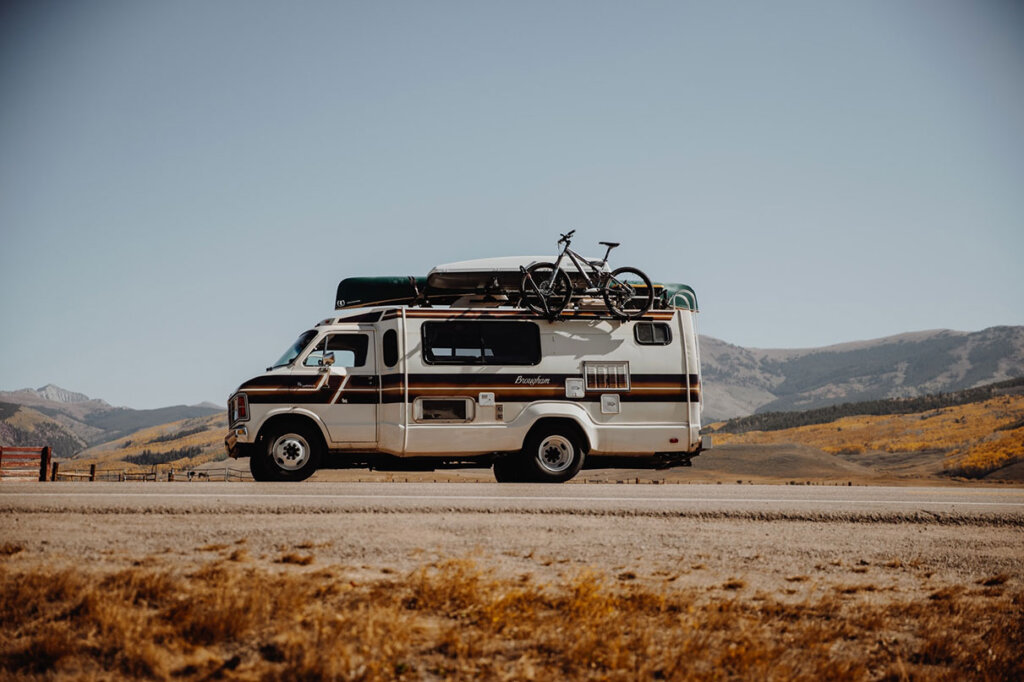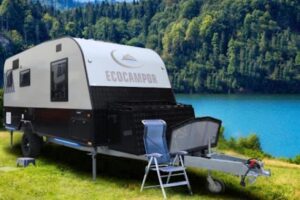The Dilemma
Once you’ve made the choice to buy an RV, you’re going to immediately face another important decision: motorhome or travel trailer?
Everyone is going to have a vastly different set of needs and desires for their ideal camper, and a multitude of factors are going to influence which type of camper you’ll want to snag for yourself.
Do you like a taste of luxury when camping? Or are you ok with roughin’ it? How many people will be joining you on your RV adventures? What’s your budget?
If you don’t carefully consider these sorts of questions before buying, there’s a strong possibility you’ll face some buyer’s remorse later down the line.
The Differences
So, what exactly is the difference between a motorhome and a travel trailer? Let’s touch on that for just a moment.
Motorhomes
Simply put, a motorhome is a self-propelled recreational vehicle. This means that the camper itself has a motor and can be driven without the need for a towing vehicle such as a truck or an SUV. Motorhomes come in a variety of sizes and are categorized into classes based on these sizes.
- Class A: These motorhomes are the largest and generally considered the most luxurious motorhomes on the market. Some are large and heavy enough to require a special driver’s license to operate.
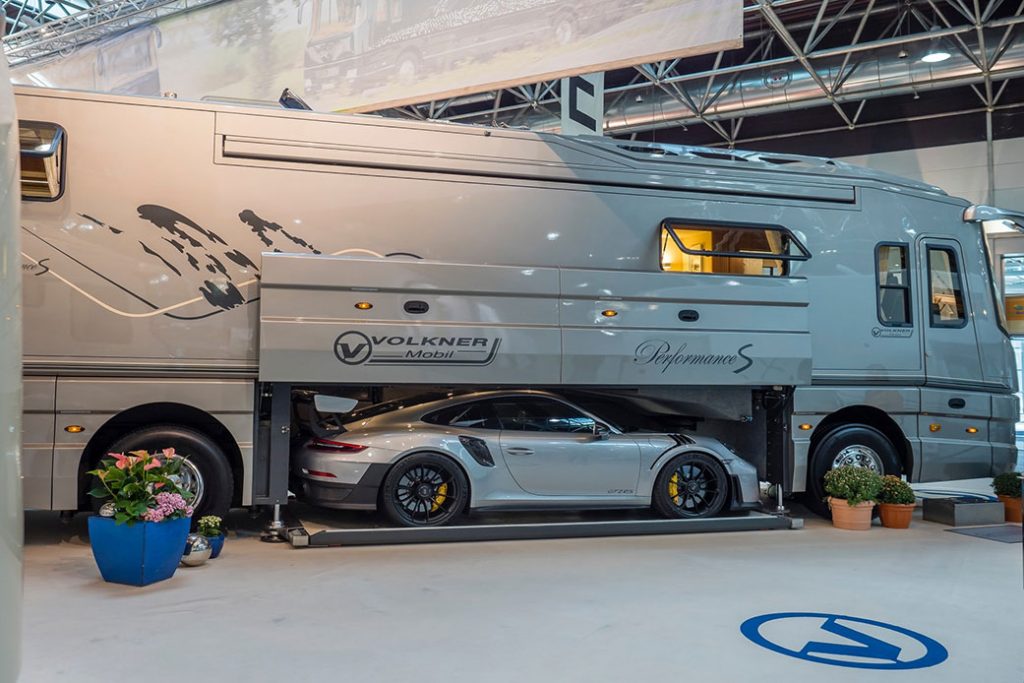
- Class B: Smaller than both Class A and Class C motorhomes, Class B motorhomes are sometimes referred to as low-profile motorhomes. The most common type of Class B motorhome on the road these days is a converted van.

- Class C: These medium sized campers split the difference between a Class A and a Class B. They feature larger bodies than a Class B and therefore offer more livable space. The easiest way to tell if a motorhome is a Class C is by looking above the cab of the vehicle. If part of the RV body extends out over the cab, it is almost certainly a Class C. The section above the cab is a “double berth”, and offers additional sleeping areas that are almost never available in Class B.
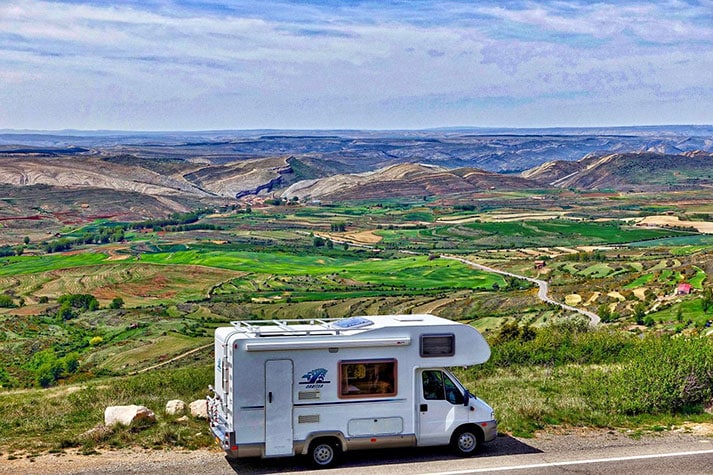
Travel Trailers
A travel trailer does not have its own motor and must be towed in order to move. Travel trailers can be just as big, or much smaller than motorhomes depending upon the type. Here are a couple of different types of towable trailers available on the market:
- Travel Trailer: Although the term is used broadly, “travel trailer” refers to a specific size and type of towable camper. These are medium sized campers, and are what most people think of when they hear the term “travel trailer”.
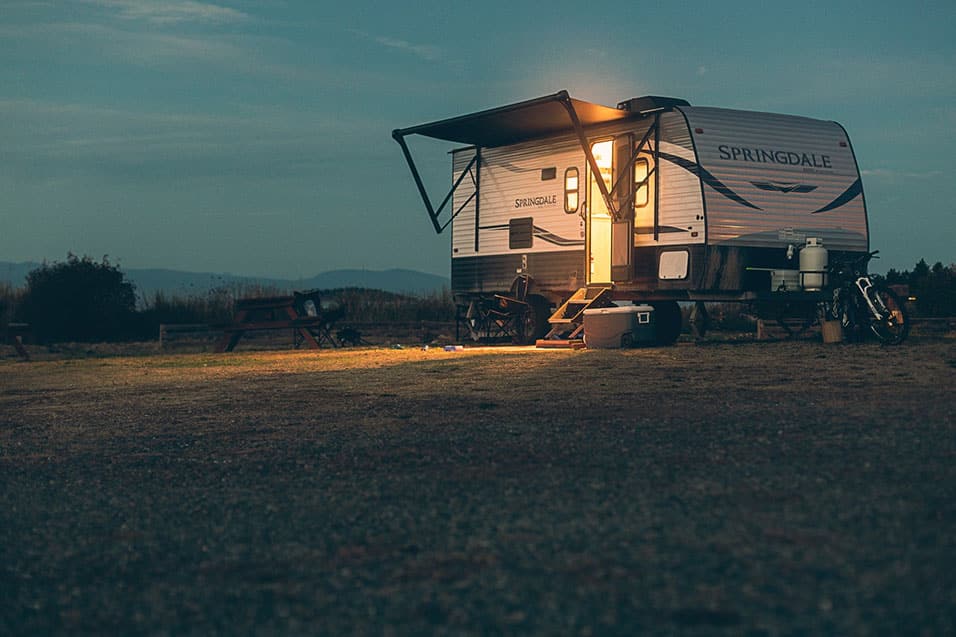
- Lightweight: These trailers are built lightweight in order to maximize fuel efficiency. While smaller than a travel trailer or fifth wheel, lightweight trailers are still quite comfortable for two grown adults to live or travel in.
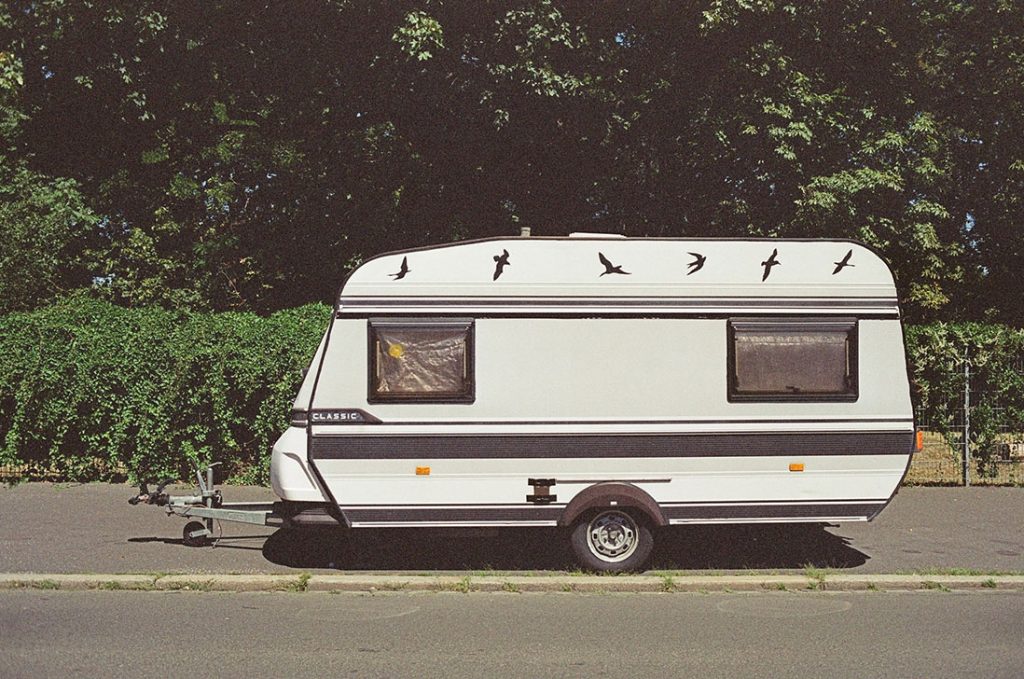
- Expandable/Pop-Up: Expandable trailers are also known as pop-up trailers due to their ability to “pop-up” and create a large living area. While being towed, these campers are collapsed into a condensed, aerodynamic, and fuel efficient trailer. Once parked, they open into a large canvas-walled trailer resembling a camper/tent hybrid.
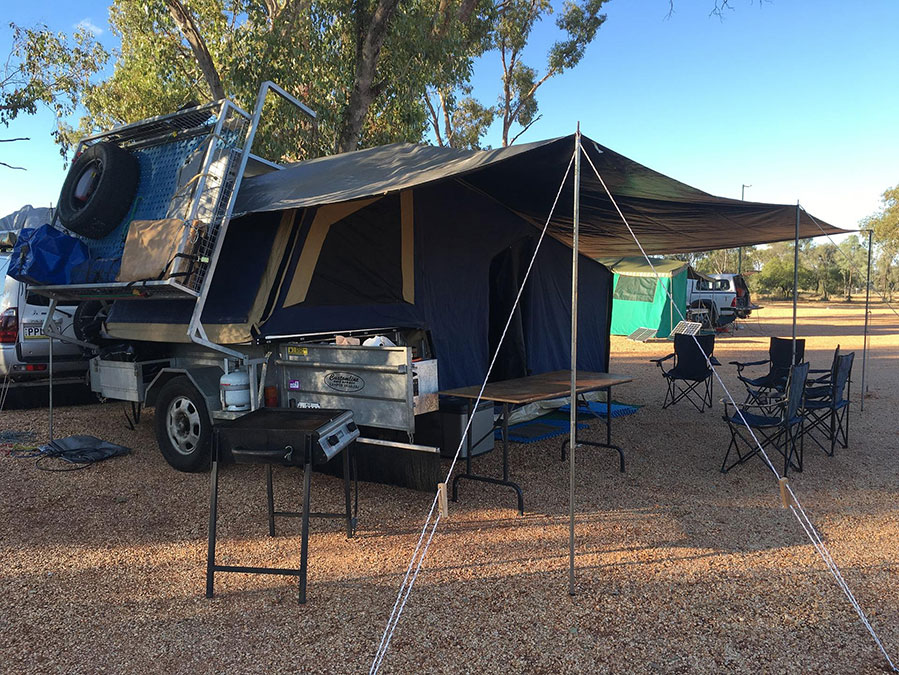
- Teardrop: My personal favorite type of towable trailer, teardrops are named for their aerodynamic teardrop shape. They are uber-lightweight and can be towed by small hatchbacks and even some types of sedans. While lacking in living space, the advantage of these trailers comes from their rugged maneuverability on backcountry roads.
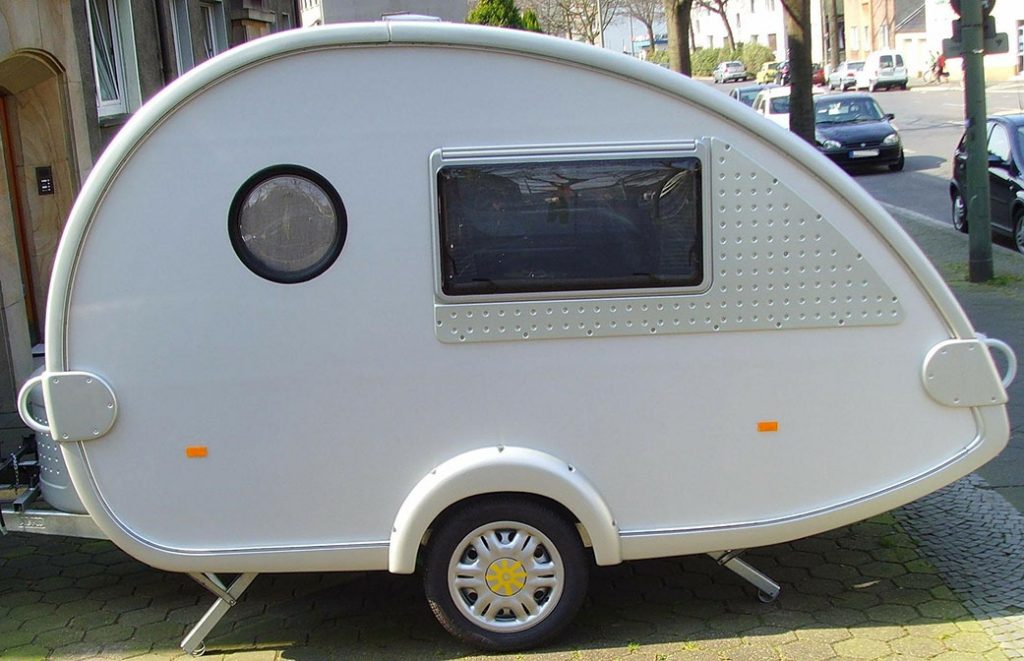
Whew, that’s a lot of campers. If these varieties aren’t appealing to you, check out this fiberglass truck camper that isn’t a motorhome or a travel trailer.
The Comparisons
It’s time to do some comparing. Here I’m going to talk about a few key differences in what it’s like owning and traveling in a motorhome versus a travel trailer.
Price
One of the biggest considerations when it comes to purchasing, the price of a rig will often be the first thing that will entice or deter someone. As a rule of thumb, one should expect motorhomes to always be more expensive than a towable trailer of the same size.
This is largely due to the fact that a motorhome contains an engine and all the parts required to make it roll. These parts don’t come cheap. It’s not uncommon to find a small motorhome for sale at a price higher than a large travel trailer. Trailers are cheaper because they don’t have as many mechanical parts and are often made a bit more light-duty than motorhomes.
Drivability
The drivability of a rig is an exceptionally subjective thing. Some people will always prefer to tow a trailer over driving a big-rig like a Class A motorhome. Some folks hate every aspect of towing and would never dream of purchasing a travel trailer.
If you’re not fully sure which of these camps you are in, I highly suggest finding a friend that owns a motorhome and finding a friend that owns a travel trailer and test drive them both. On long road trips you’ll be doing a lot of driving so it is very important to buy a camper that you will enjoy driving long distances.
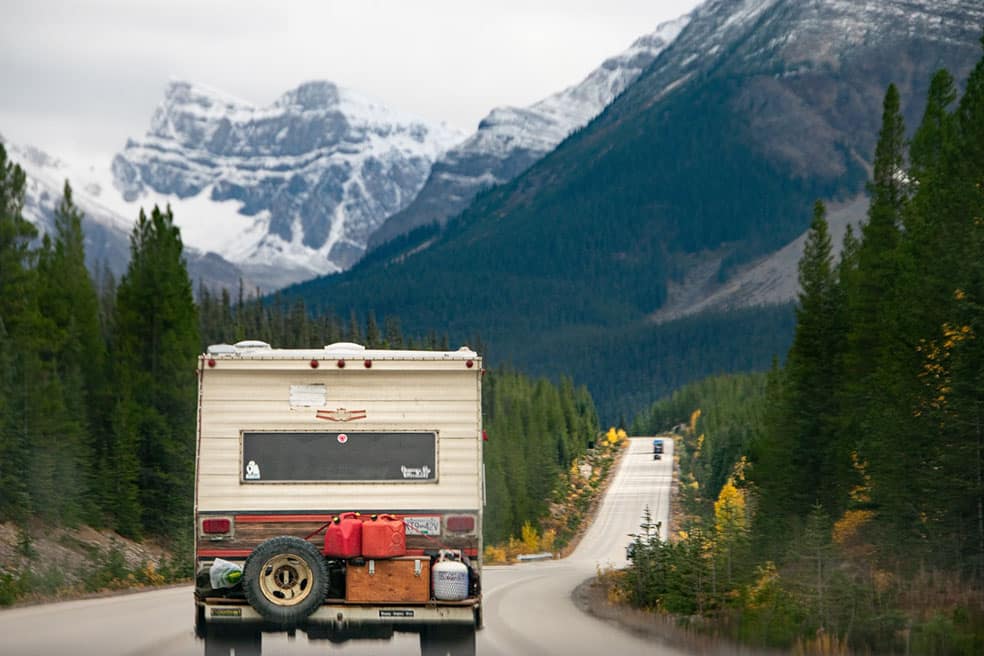
Maintenance
Trailers and motorhomes are both going to require regular maintenance. The more often it is used, the more often you will have to be allocating time and money for this maintenance. In this regard, I think travel trailers come out on top. Because they don’t have automobile parts, travel trailers are going to encounter less pricey repairs, and won’t run the risk of a full breakdown.
If a motorhome breaks down, you will have to find a way to have it towed to a shop for repairs. When towable trailers encounter extreme damage, it is quite easy to just tow it to a mechanic yourself, eliminating the cost of tow truck services.
Space and Livability
For taller folks or people who like a nice roomy camper, motorhomes are generally going to be more spacious and provide a more livable interior than a towable trailer. Motorhomes often feature “slide outs”, which are sections of the camper that can be opened using hydraulics to create additional living and sleeping areas. While it’s not common to find slide outs on a trailer, large fifth wheels typically have them.
The beauty of trailers is the range of sizes they come in. After years of sleeping in my home built truck bed canopy camper, I find anything larger than a teardrop trailer to be an utter luxury. For those of you just looking for a space to lay your head in the evening, a towable trailer should be more than enough camper.
Range and Durability
Some folks are going to primarily be using their camper to drive to scenic RV parks and post up for several days or weeks at a time, exploring the nature and towns around the park. Some are going to be wanting to get their camper deep into the backcountry and find a secluded spot to boondock, isolated from the rest of society. Both are righteous paths.
For RV park adventurers, motorhomes and fifth-wheels are your way to go. Bring all the comforts of modern life with you as you explore America the Beautiful. Backcountry boondockers will be needing a teardrop or pop-up trailer because you will likely not be able to drive other types of campers on the 4×4 roads that lead to true isolation.
Consider your adventure style, how you want to be accessing the outdoors, and which camper style will be best suited for these adventures.
Insurance
The insurance you must purchase for your rig will play into the overall lifetime cost of owning a camper. Keeping in mind the cost of purchasing, maintenance and repairs, and gas, insurance is a recurring cost that should be considered and researched prior to purchase.
Insurance for a motorhome will virtually always cost more than insurance for a travel trailer. This is partially due to the fact that motorhomes are generally larger than trailers, and partially due to the liability that comes with insuring a camper with a motor.
For budget-minded travelers, trailers are the best option to save money on insurance. Travel trailer insurance is cheap and can be easily bundled with automotive insurance. In some regions of the USA, teardrop trailers aren’t legally required to have insurance and the policies that are available are very affordable.
Depreciation
With the exception of classic, coveted models, all vehicles depreciate over time. The same is true of trailers and motorhomes. Consider how long you’ll want to have your camper and how much of a return on the investment you’ll be looking for when you do eventually sell.
If you’ll be wanting to get as much of your original purchase price back as possible, go for a travel trailer. Due to their lack of engine, trailers depreciate at a slower rate than motorhomes, and eventually that depreciation will plateau. Motorhomes on the other hand depreciate hard and fast and will continue to drop in worth as the engine ages.
Closing Thoughts
I’m not going to give a cut-and-dry answer to the question, “Which is better, a motorhome or a travel trailer?” This question has far too many variables influencing the outcome and is incredibly subjective by nature.
Because we all have unique wishes and desires for our ideal adventure and camper, there is simply no one-size-fits-all answer. For some people buying a towable trailer is the clear and obvious answer right out the gate. Others would never dream of purchasing anything other than a motorhome for traveling. Both are legitimate answers because both will satisfy the particular needs of their owners.
So, do a ton of research, think hard, and soul search for a bit. Consider the variables I discussed above and find out what rig will work best for your lifestyle and the lifestyles of your family and friends.
YouTube can be a great source of knowledge and can be useful for getting a feel for what kind of camper you might be interested in. The Ecocampor YouTube channel features an array of videos that offer virtual tours of our campers and RVs. Give this tour video of our 19′ slide-out travel trailer a peek:
Buying a camper is an exciting time but should not be rushed into. With due diligence, it is easy to ensure you end up with the perfect rig for all of your outdoor adventures. Good luck!

